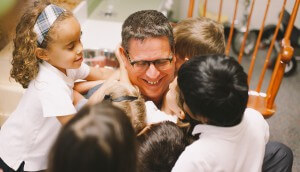April 14, 2016
My favorite teacher at Parkview Elementary was Mrs. King. I met Mrs. King in the third grade when my family moved to Marquette, Mich. halfway through the school year. I remember feeling sad about leaving my friends behind and terrified about starting over in a new school in a new town without knowing anyone. From the moment I walked into her classroom, however, Mrs. King welcomed me and, after a few days, my concerns were assuaged and I was happy.
I met Mrs. King in the third grade when my family moved to Marquette, Mich. halfway through the school year. I remember feeling sad about leaving my friends behind and terrified about starting over in a new school in a new town without knowing anyone. From the moment I walked into her classroom, however, Mrs. King welcomed me and, after a few days, my concerns were assuaged and I was happy.
I remember how much I learned that year—I was a sponge, soaking up everything. For years afterwards, my parents teased me because I would often contradict them based on what Mrs. King said. I don’t remember much about what we did in Mrs. King’s classroom, but I do remember how she made me feel. Forty-four years later, I clearly recall being engaged, encouraged, challenged, and loved.
We talk a lot about joyful learning at MPA. It is in all of our marketing and promotional materials, and is even included in our messages on Minnesota Public Radio. I see it every day as I stand at the south entrance of the school and see the smiles on the faces of our students as they enter the building. I delight in their energy and enthusiasm. Joyful learning is much more than a mere marketing slogan. Rather, it is a key thread woven throughout the culture of MPA that leads to high levels of academic achievement.
Dr. Christina Hinton from the Harvard Graduate School of Education found that from elementary school to high school, happiness is positively correlated with motivation and academic achievement. She also found that the culture of the school and the relationships that students form with their teachers and their peers play an influential role in their happiness. “In this study, we found that a network of supportive relationships is at the heart of happiness,” Hinton says. “If schools want to support student well-being and achievement, they should take seriously nurturing positive relationships among teachers and students.”
What educators know from experience, scientists have been able to validate with research. Neuroimaging studies and measurement of brain chemical transmitters reveal that a student’s comfort level can influence information transmission and storage in the brain (Thanos et al., 1999). When students are engaged and motivated and feel minimal stress, information flows freely through the affective filter in the amygdala and they achieve higher levels of cognition, make connections, and experience “aha” moments. Such learning comes from classrooms with an atmosphere of exuberant discovery (Kohn, 2004).
Unfortunately, the joy of learning that many children begin with in kindergarten is lost in the quest for higher standardized test results. The resulting pressure placed upon teachers leads them to rote learning and teaching strategies that rely on “drill and kill” and “command and control” methods. A joyful classroom is sometimes loud, chaotic, and messy, and it is filled with engaged learners who feel comfortable, valued, and safe.
When I reflect on the “why” of joyful learning at MPA, several philosophical and pedagogical principles come to mind:
- Teachers and staff that genuinely know students personally and take the time to learn about their strengths, needs, and interests.
- Small classes that afford both teachers and classmates the opportunity to know one another well.
- Student-centered learning that inspires creativity and fosters curiosity.
- High levels of trust so that students can express themselves and their ideas without fear of being put down or ostracized.
- A safe, nurturing community built upon mutual respect so that students are free to be who they really are and not what they think others want them to be.
I crossed paths with two tenth-grade students this morning and posed the question: “What comes to mind when I say joyful learning?” They both replied that it was the way in which teachers taught and the way they engaged students, fostering critical thinking, and encouraging debate around topics that are meaningful and relevant. Ultimately, the students mentioned teachers by name. It is the incredible sense of community and the strong, nurturing relationships that students have with their teachers at MPA that keeps the joy of learning alive and strong from kindergarten to their senior year.